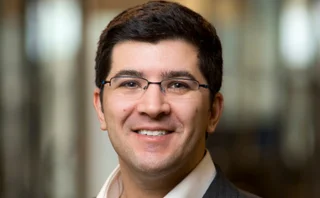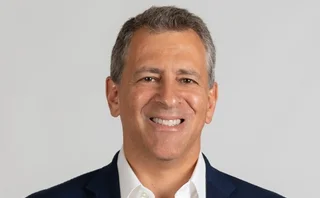
Commodity exchange of the year: CME Group
Energy Risk Awards 2022: Exchange develops suite of products for managing energy transition risk

The past year has seen a growing sense of urgency among corporates to reduce their emissions. This led CME Group, winner of the 2022 Energy Risk Commodities exchange of the year award, to develop and launch a suite of products that address the resulting risk-management needs.
While some industries are already subject to environmental regulations, in others companies are investing in decarbonisation strategies and offsetting their remaining emissions via voluntary markets. CME Group launched a sustainable clearing initiative in September 2021 to enable these organisations to validate their green hedging efforts. It operates across the energy transition-linked markets the exchange group covers, including carbon, battery metals and bioenergy.
According to Peter Keavey, CME Group’s global head of energy and environmental products, this growing suite of voluntary carbon contracts has also helped companies that are already investing in decarbonisation and offsetting their remaining emissions. For example, following what is thought to have been the first carbon-neutral oil shipment in January 2021, more oil and gas companies are seeking deals that include an emissions offset element. These transactions enable producers or shippers to offset the carbon content of their cargoes by simultaneously trading matching volumes of carbon offsets.
CME Group currently offers three products for the voluntary carbon markets, including the most recently launched CBL C-Global Emissions Offset (GEO) futures in March 2022. This contract was developed to align with the Core Carbon Principles, an emerging set of transparent and consistent standards around the supply of carbon credits, overseen by the Integrity Council for the Voluntary Carbon Markets.
In August 2021, CME Group launched a CBL nature-based Global Emissions Offset (N-GEO) futures contract. It is linked to projects that protect, transform or restore land to allow more CO2 emissions to be absorbed from the atmosphere. “Nature-based credits have historically traded in opaque and fragmented markets and the launch of N-GEO futures, which physically delivers into the Verra Registry, was critical in establishing a global benchmark and creating greater transparency in this crucial but emerging market,” says Keavey.
Including CME Group’s first voluntary carbon market contract – the CBL GEO futures contract launched in May 2020 – more than 100,000 contracts have been traded across CME Group’s voluntary carbon suite to date. This is equivalent to 100 million carbon offset credits or 100 million metric tons of CO2 equivalent. “This milestone of 100 million offsets traded is an exciting step in the path towards net zero, creating more transparency and liquidity that will be key to advancing strategies and meeting global environmental targets,” Keavey says.
Beyond the carbon markets, CME Group has also launched market-based initiatives designed to support investment in energy transition technologies. Following what the International Energy Agency called a “pivotal year” for growth of the electric car industry in 2020, CME Group launched the first cash-settled battery metals risk management products: a cobalt contract in December 2020 and a lithium contract in May 2021. These metals are key components of the batteries used to power electric vehicles. According to the IEA’s Net Zero Emissions by 2050 scenario, 300 million electric cars will be on the road by 2030, accounting for more than 60% of new car sales.
Cobalt futures have already found widespread adoption across the supply chain, according to Keavey, with open interest recently surpassing 2,000 metric tons for the first time. Since launch, more than 5,000 metric tons have traded in total, and CME Group has extended the curve three times based on client demand.
Other energy transition-related offerings include futures contracts for Used Cooking Oil (UCO) and Used Cooking Oil Methyl Ester (UCOME). These products are designed to cover markets impacted by ethanol and biodiesel blending mandates. As such requirements continue to push the integration of the commodities complex ahead of the transition, the exchange has worked with clients from agricultural and energy sectors to boost understanding of supply and demand from the respective markets.
CME’s willingness to launch contracts in new markets is bringing new and much-needed risk management tools to corporates across multiple industries that need to address the significant challenges of the energy transition.
Only users who have a paid subscription or are part of a corporate subscription are able to print or copy content.
To access these options, along with all other subscription benefits, please contact info@risk.net or view our subscription options here: http://subscriptions.risk.net/subscribe
You are currently unable to print this content. Please contact info@risk.net to find out more.
You are currently unable to copy this content. Please contact info@risk.net to find out more.
Copyright Infopro Digital Limited. All rights reserved.
As outlined in our terms and conditions, https://www.infopro-digital.com/terms-and-conditions/subscriptions/ (point 2.4), printing is limited to a single copy.
If you would like to purchase additional rights please email info@risk.net
Copyright Infopro Digital Limited. All rights reserved.
You may share this content using our article tools. As outlined in our terms and conditions, https://www.infopro-digital.com/terms-and-conditions/subscriptions/ (clause 2.4), an Authorised User may only make one copy of the materials for their own personal use. You must also comply with the restrictions in clause 2.5.
If you would like to purchase additional rights please email info@risk.net
More on Commodities
Energy Risk Asia Awards 2025: The winners
Winning firms showcase the value of prudent risk management amid challenging market conditions
Data and analytics firm of the year: LSEG Data & Analytics
Energy Risk Awards 2025: Firm’s vast datasets and unique analytics deliver actionable insights into energy transition trends
OTC trading platform of the year: AEGIS Markets
Energy Risk Awards 2025: Hedging platform enhances offering to support traders and dealers in unpredictable times
Electricity house of the year: Natixis CIB
Energy Risk Awards 2025: Bank launches raft of innovative deals across entire electricity supply chain
Voluntary carbon markets house of the year: SCB Environmental Markets
Energy Risk Awards 2025: Environmental specialist amplifies its commitment to the VCM
Sustainable fuels house of the year: Anew Climate
Energy Risk awards 2025: Environmental firm guides clients through regulatory flux
Weather house of the year: Parameter Climate
Energy Risk Awards 2025: Advisory firm takes unique approach to scale weather derivatives markets
Hedging advisory firm of the year: AEGIS Hedging
Energy Risk Awards 2025: Advisory firm’s advanced tech offers clients enhanced clarity in volatile times







